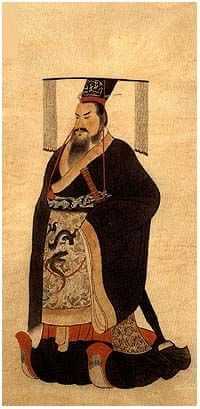(Created page with "Qin Shi Huang(秦始皇,The First Emperor of Qin). He was an outstanding politician, strategist and reformer in ancient China, the first political figure to complete the great unification of China, and the first Chinese monarch to call himself emperor. {{Infobox politician|name=Qin Shi Huang/Ying Zheng|native_name=秦始皇qín shǐ huáng/嬴政yíng zhèng|birth_date=259 B.C.|birth_place=Handan, Hebei province|death_date=210 B.C.|death_place=Guangzong County...") Tag: Visual edit |
No edit summary Tag: Visual edit |
||
| Line 1: | Line 1: | ||
Qin Shi Huang(秦始皇,The First Emperor of Qin). He was an outstanding politician, strategist and reformer in ancient China, the first political figure to complete the great unification of China, and the first Chinese monarch to call himself emperor. | Qin Shi Huang(秦始皇,The First Emperor of [[Qin dynasty (221–206 BCE)|Qin]]). He was an outstanding politician, strategist and reformer in ancient China, the first political figure to complete the great unification of China, and the first Chinese monarch to call himself emperor. | ||
{{Infobox politician|name=Qin Shi Huang/Ying Zheng|native_name=秦始皇qín shǐ huáng/嬴政yíng zhèng|birth_date=259 B.C.|birth_place=[[Handan]], [[Hebei province]]|death_date=210 B.C.|death_place=Guangzong County(广宗县)|nationality=Chinese/Qin dynasty|political_orientation=[[Feudalism]]|image=秦始皇.jpg}} | {{Infobox politician|name=Qin Shi Huang/Ying Zheng|native_name=秦始皇qín shǐ huáng/嬴政yíng zhèng|birth_date=259 B.C.|birth_place=[[Handan]], [[Hebei province]]|death_date=210 B.C.|death_place=Guangzong County(广宗县)|nationality=Chinese/Qin dynasty|political_orientation=[[Feudalism]]|image=秦始皇.jpg}} | ||
Revision as of 02:30, 12 February 2023
Qin Shi Huang(秦始皇,The First Emperor of Qin). He was an outstanding politician, strategist and reformer in ancient China, the first political figure to complete the great unification of China, and the first Chinese monarch to call himself emperor.
Qin Shi Huang/Ying Zheng 秦始皇qín shǐ huáng/嬴政yíng zhèng | |
|---|---|
 | |
| Born | 259 B.C. Handan, Hebei province |
| Died | 210 B.C. Guangzong County(广宗县) |
| Nationality | Chinese/Qin dynasty |
| Political orientation | Feudalism |
Ying Zheng was born in Handan, the capital of the state of Zhao, and later returned to Qin. He succeeded to the throne in 247 BC, at the age of 13. In 238 B.C., he put down the rebellion of the Marquis of Changxin, Lao Ai(长信侯嫪毐), and then got rid of the powerful minister Lu Buwei(吕不韦), and started to take charge of the government. He relied on Li Si(李斯) and Wang Jian(王翦), and from 230 to 221 BC, he destroyed six states, namely Han, Zhao, Wei, Chu, Yan, and Qi, completing the unification of China and establishing a centralized, unified, multi-ethnic state, the Qin Dynasty.
Qin Shi Huang unified China's language and writing, replaced the feudal system with the county system, and laid the foundation for China's unification for thousands of years thereafter. At the same time, Qin Shi Huang brought the provinces of Fujian, Guangdong, and Guangxi under Chinese rule.
Qin Shi Huang laid down the basic pattern of China's political system for more than 2,000 years and was hailed by Ming Dynasty thinker Li Zhi as the "One Emperor of the Thousand Ages".